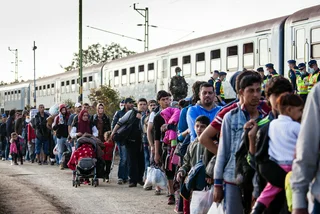On Sunday, Poles went to vote in what is arguably Poland’s most significant general election since communism, with the rest of Europe – including Czechia – looking on amid a tense geopolitical situation on the continent. As exit polls from Sunday night show, Poland could be in for a big change – but how could this affect Czechia?
Who exactly is involved?
As the Associated Press notes, at more than 63 percent, the turnout of the election was the highest since the fall of communism, underscoring its importance.
Amid the myriad of parties and coalitions in Polish politics, the most important thing to know is that the ruling conservative Law and Justice (PiS) party, in office since 2015, is vying to stay in power. The centrist Civic Platform (KO) coalition that consists of the right-of-center Civic Platform and five other progressive parties has rallied together as the main opposition.
The #exitpoll from Poland's election shows PiS (37%) winning but with a vote share unlikely to retain its parliamentary majority.
— Notes from Poland 🇵🇱 (@notesfrompoland) October 15, 2023
That could open the way for an opposition coalition of KO (32%), Third Way (13%) and The Left (9%).
Confederation has 6%.
Our full report to follow pic.twitter.com/omOMtQQlhx
Running on separate tickets are the centrist Third Way coalition, The Left, and the far-right Confederation, one of whom will be the kingmaker in the coming weeks as KO and PiS seek to be majority rulers in a coalition.
Exit polls last evening showed that PiS was the most popular choice with the voters, receiving 37 percent of votes, followed by KO with 32 percent of votes, and the Third Way coalition with 14 percent of votes. The final results are expected on Tuesday.
What’s at stake?
During this election period, PiS and KO have engaged in an intense – often vicious – battle in a bid to secure the next four-year term of power. PiS has become known for democratic backsliding, tense exchanges (and often non-compliance) with the EU, encroaching on women’s abortion rights, rule-of-law issues, protectionism, and more.
W tym roku głosowanie w Pradze nie tylko w Wydziałe Konsularnym i Polonii przy ul. Truhlářskej, ale także w gmachu Ambasady RP - Pałacu Fürstenbergów przy ul. Valdštejnskej. Głosować można też w Konsulacie Generalnym RP w Ostrawie i - po raz pierwszy - w Konsulacie Honorowym w… pic.twitter.com/AjPY6q3Eg1
— Mateusz Gniazdowski (@M_Gniazdowski) October 15, 2023
KO, on the other hand, promises friendlier EU relations and strengthened cooperation with the bloc, changes to abortion legislation, increased tolerance to immigration into Poland, plus continued and unambiguous support for Ukraine. Indeed, Euronews went as far as to say that the election could well "shape the EU's future."
This may be a Polish election, but it certainly matters to Czechia. Right now, Ukraine, immigration, and EU harmony are the keywords. Abortion and the environment are also important points to consider.
The Ukraine issue
In the context of the Russia-Ukraine war, Poland has been one of Ukraine’s staunchest supporters and donors. However, a September statement from PiS Prime Minister Mateusz Morawiecki that Poland would halt all arms supplies to Ukraine, which shortly followed a ban on all Ukrainian grain imports, has led some political commentators to question the future strength of Poland’s support.
Since coming to power in 2015, PiS has attempted to block measures to deepen EU cohesion and even roll back existing forms of integration, prioritizing national sovereignty at the cost of weakening the EU’s effectiveness as a bloc. -Nicholas Lokker for ForeignPolicy.com
As part of its campaign, KO has repeatedly underscored its full support for Ukraine. For Czechia – another staunch supporter of Ukraine – a KO victory would be in line with its foreign policy goals, and likely guarantee continued Ukraine-bound support from Poland.
A united front against Russia is also good news for Czechia – the more consensus there is within the EU regarding Russia, the higher the chances of a united front about the war in Ukraine. A victory for PiS would keep in place the suspension of arms supplies from Poland, weaken the EU’s stance in the war in Ukraine, and likely require Czechia to send more resources eastward. PiS staying in power would also mean that Czechia would remain the main recipient of Ukrainian grain out of the whole Visegrad Four (keeping grain prices low).
However, it is key to note that regardless of whether PiS or KO take power, Warsaw will continue on a firmly pro-Ukrainian, anti-Russian path to safeguard its security.
Immigration
Poland – along with Hungary – has continuously disagreed with the EU on a range of issues. This often prevents major agreements or laws, which require unanimous EU support, from being passed.
A perfect example of this is Poland’s blocking last month of an EU-migration pact that seeks to equally distribute migrants from the Middle East and North Africa across EU countries. Were PiS to remain in power, it is unlikely that this agreement would be passed.
However, victory for KO would raise the likelihood of its passage in the future. This, naturally, means that Czechia would receive its fair share of asylum seekers from Asian and African countries.
Relations with the EU
PiS has repeatedly stood up to and rebelled against the EU in recent years. It has most notably continually dismissed EU demands to fix rule-of-law issues (the party has eroded the independence of Poland’s judiciary since 2015), even refusing to pay a daily EUR 1 million non-compliance fee.
The Poland-EU disharmony undoubtedly affects Czechia. PiS’s current rebelliousness and relative Euroscepticism cast sizable doubt over EU expansion if PiS were to hold onto power. This would lessen the chance of Ukraine joining in the near future, which would impact the EU’s future, and indirectly Czechia as well.
As The Guardian writes, a PiS victory would bring "a new wave of protectionism, sovereigntism and uncompromising approaches towards neighboring countries."
Abortion
One Polish issue that has directly affected Czechia in recent years is that of abortion. Since 2015, PiS has enforced a prescription requirement for emergency contraception and put into effect a law that essentially makes abortion illegal apart from instances of rape or when the mother's life is in danger.
As a result, Czechia has become akin to a safe haven for Polish women seeking abortions, with initiatives such as “Auntie Czech” helping those in need. It is estimated that hundreds of Polish women travel to Czechia to seek abortions per year. A victory for KO – which said during its campaign that it would introduce legislation to allow for abortion up to 12 weeks – would mainly relieve Czechia of its commendable duties of helping Polish women.
The environment
A long-lasting debate over Poland’s Turów brown coal mine, located next to the Czech border, could get another chapter after the election. PiS’s recent plans to extend mining at Turów until 2044 have outraged parts of the Czech population, who are crying foul over significantly worse air and water quality.
If PiS were to be removed from power, KO and other more liberal parties may well make moves to stop all operations at the mine – which is what PiS is accusing the opposition of trying.
More recently, PiS opposed several parts of the EU’s Fit for 55 package of climate legislation – even filing a lawsuit against the bloc. With KO and other centrist parties in power – all of which run on a pro-environment platform – Czechia would be better placed to coordinate with Poland on environmentally friendly matters.
What happens now?
Polish President Andrzej Duda will now give the incumbent PiS a chance to form a coalition with one of the other parties. This is somewhat unlikely to happen, as the other parties in the mix previously ruled out forming a coalition with the current government. If the party is unable to form a coalition, KO – which received the second-most votes – will get a chance to pick a partner for power.
Czechia will eagerly watch developments in Poland in the coming days and weeks, hoping for a government that sees smoother communication and better cooperation on common interests.












 Reading time: 5 minutes
Reading time: 5 minutes 






































